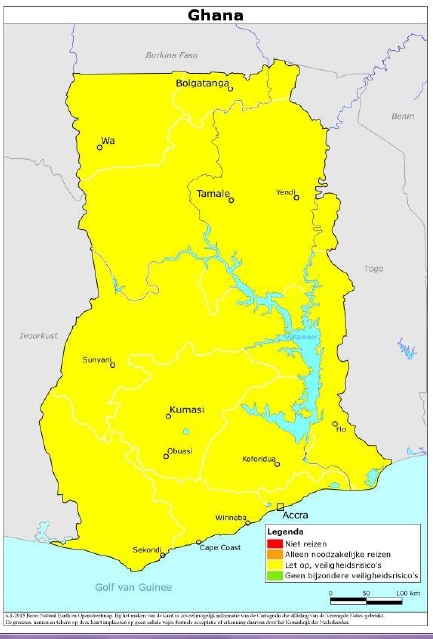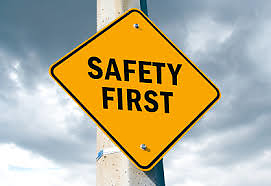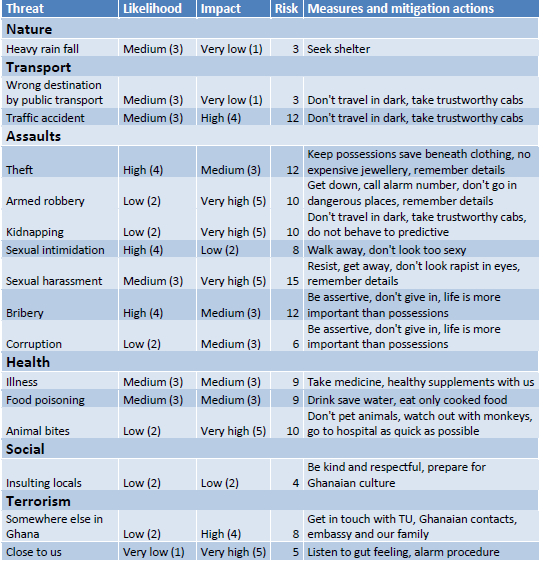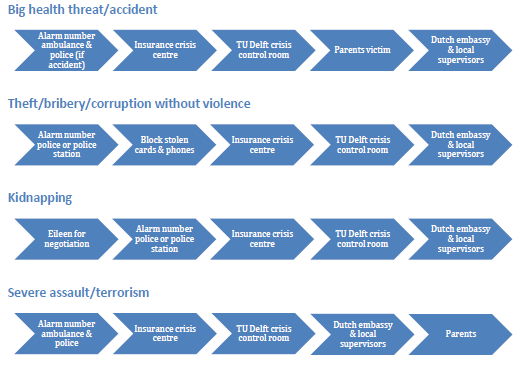Context analysis
We are going to Kumasi, Ghana. Ministry of Foreign Affairs claims that in the whole country there are mild security risks, see below. Kumasi is the capital of the Ashanti region and the second biggest city of Ghana, with its 1.5 million people. The Portuguese were the first western people who encountered the local inhabitants at the end of the sixteenth century. Also the Dutch build their own fortresses at the coastline. From the nineteenth century until 1957, Ghana was a British colony. The main language in Ghana is still English. The local language in Kumasi is Twi. Through the whole country, there are many different ethnic groups with all their own language.
Since its independence in 1957 there was a period of many different leaders. From 1992 until now, Ghana is a democracy and since the elections in 2012 John Mahama is the president.
Some interesting social economical data of Ghana are the life expectancy, which is 61 years, and most of the poverty is located at the countryside. Also in 2012, 24.2% of the population where living beneath the poverty limits. The Ghanaian are known as friendly and helpful people.
Ghana has a tropical climate with a lot of tropical diseases. There are two mean seasons, the wet season and the dry season. When we arrive it will be the transition of the wet season to the dry season. Mostly, we will be there during the dry season. There weren’t any big disasters the last few years.

Risk analysis
Points of attention during the trip & risk reduction strategy
The most important attention points for our trip are the threats with a high consolidated risk, column 4 from table 1.
Traffic accidents
For transport risks, traffic accidents will have a large impact. It is hard to prevent an accident, because this can be caused by every other vehicle on the road. To reduce the risks, we will not drive ourselves. Furthermore, we will only take cabs of companies/drivers which are recommended to us by our Ghanaian supervisors. There is no or little street lighting, therefore travelling in the dark makes us more vulnerable for accidents. We will travelling or going out on the road when it is still light.
Theft
Theft is something which is likely to happen if we don’t prepare well and pay attention. As western looking people we will be considered as rich; poor, opportunistic Ghanaians want to take advantage of us. Our home will be guarded so we expect our possessions to be save there. When we leave the house, we will take as little important belongings with us as possible. No jewellery except for fake wedding rings for Valerie en Senja. We will take our mobile phones with us on our body, so we can communicate when an incident happens. If we go on longer trips we will also take our passport with us on a save spot and our debit/credit cards. We will always take copies of all our important documents with us. If we are being threaten it is important to have a small amount of cash money with us, so we can offer something and get away without losing large sums of money. We’ll bring cash money in the local currency (cedi) and strange currency (euro).
Armed robbery
Armed robbery will have a huge impact on our trip. We need to stay out of dangerous places and bad neighbourhoods. If our gut feeling tells us something is wrong we will listen to that feeling and walk away. When this happens we will follow the CARE method and our alarm procedure.
Kidnapping
If someone is kidnapped this is a catastrophic event. We will stay in save neighbourhoods and stay together at night. We will avoid being predictive and try to take different routes home or to our work place.
Sexual intimidation and harassment
Sexual intimidation and harassment are more likely to happen to Valerie and Senja. We will always dress modest, without much skin showing. We will wear fake wedding rings , so we can turn down any pushy man. We will not go out alone and if we leave the house in the evening Gijs has to go stay with Valerie and Senja.
Bribery and corruption
Bribery and corruption are things we are not used to in Holland, but in Ghana this is more common. If we are bothered by for example corrupt policemen or bad taxi drivers, we will stay calm and be assertive. We won’t have a lot of expensive possessions with us, but first we will try not to give anything. We will tell them that our King William does not want us to give anything. Of course our lives are more important than anything we posses. So under a real threat we will give them what they want, as little as possible of course. We do need to make sure that we can get away after they bribed us.
Health risks
Ghana is a tropical country with different food and water than here in Holland. There are all kinds health risks. We have been vaccinated for, hepatitis A&B, yellow fever, meningitis, abdomen typhoid, and diphtheria, tetanus and polio and we will take malaria nets and medicines with us. We did not take the rabies vaccinations. We will stay away from animals on the street and when we go on wildlife trips we will not get too close. If we are bitten or licked by an animal we will immediately go to a private hospital to get vaccinations. Before departure we will search for good private clinics we can visit if needed.
Food poisoning is also likely to happen, from unclean water or bad vegetables. We will only drink clean water and wash our vegetables very thoroughly. Senja pays more attention to this in her daily life then Valerie and Gijs. She will keep an extra eye on the safety of food and on hygiene.We will try to prevent illness and live healthy. We will prepare by buying vitamin tablets and other supplement. Valerie will take a small EHBO kit with her, so if one of us has a minor injury we can first treat is ourselves.
Terrorism
It is highly unlikely a terrorist attack will happen in our direct environment. We will pay attention in large crowds and get away when we feel that the crowd is turning in a mob. We will also be alarmed if all the locals are suddenly gone.
Behaviour
Personal behaviour
In the risk reduction strategy we already talked about how we should behave in different situations. In common we will be calm and friendly to the local people. We bought a book on Ghana and its culture. We found out it is important to respect the elderly and tribal chiefs. They have a great authority and if we want to get something done they will be important. Furthermore we will be careful regarding drunk people or people on drugs.
Group rules of engagement
Do not go out on your own
Always know where the others are
Take copies of important documents with us
Modest clothing
Stay in save neighbourhoods
If someone does not feel well take good care of them
Eat safe food and drink safe water
Listen to each other and respect each other
Do not damage TU Delft image
Contingency plan
We will make different action plans for different incidents.
Action plan
Incident reporting
In the annexes there is a list of our important contact and telephone numbers. They are listed on priority to call when an incident happens. Eileen will only be contacted in case we are taken hostage and negotiation is needed. In the flowcharts below we present the order of calls when certain incidents happen.
Organization details
Details of the organization you are visiting
The organization is AfroEuro, they have an office a few hundred meters from our house. We can work there and be in touch with our local supervisors.
What does the S&S plan of the organization look like?
It is a small organization with no full-time employees, so there is no formal S&S plan.
Whom should we contact in case of a crisis?
Our local supervisors Eric and Bismark should be contacted, see annexes.
Accommodation and transport
What will your accommodation look like locally?
We will live in a house with two bedrooms, a living room, kitchen and bathroom. There will be a guard in a separate house who will secure the house.
What do your local transport arrangements look like?
Mostly by trotro, a small bus for public transport, or by cab. For more long-distant travelling we’ll travel by touring car.
What S&S aspects have been considered for accommodation and transport?
We will only take trustworthy cabs/public transport. Moreover we will try to travel with local people we know. If we get bribed by a driver we will first let the locals try to solve the problem, otherwise we will say: Our king William said: we may not give money to you.


